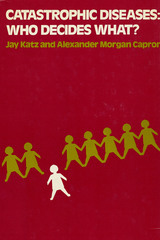
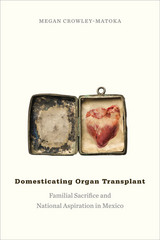
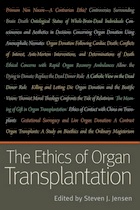
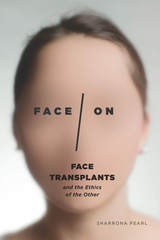
The first comprehensive cultural study of face transplant surgery, Face/On reveals our true relationships to faces and facelessness, explains the significance we place on facial manipulation, and decodes how we understand loss, reconstruction, and transplantation of the face. To achieve this, Pearl draws on a vast array of sources: bioethical and medical reports, newspaper and television coverage, performances by pop culture icons, hospital records, personal interviews, films, and military files. She argues that we are on the cusp of a new ethics, in an opportune moment for reframing essentialist ideas about appearance in favor of a more expansive form of interpersonal interaction. Accessibly written and respectfully illustrated, Face/On offers a new perspective on face transplant surgery as a way to consider the self and its representation as constantly present and evolving. Highly interdisciplinary, this study will appeal to anyone wishing to know more about critical interventions into recent medicine, makeover culture, and the beauty industry.
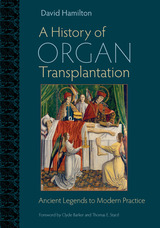
Foreword by Clyde Barker and Thomas E. Starzl
A History of Organ Transplantation is a comprehensive and ambitious exploration of transplant surgery—which, surprisingly, is one of the longest continuous medical endeavors in history. Moreover, no other medical enterprise has had so many multiple interactions with other fields, including biology, ethics, law, government, and technology. Exploring the medical, scientific, and surgical events that led to modern transplant techniques, Hamilton argues that progress in successful transplantation required a unique combination of multiple methods, bold surgical empiricism, and major immunological insights in order for surgeons to develop an understanding of the body’s most complex and mysterious mechanisms. Surgical progress was nonlinear, sometimes reverting and sometimes significantly advancing through luck, serendipity, or helpful accidents of nature.
The first book of its kind, A History of Organ Transplantation examines the evolution of surgical tissue replacement from classical times to the medieval period to the present day. This well-executed volume will be useful to undergraduates, graduate students, scholars, surgeons, and the general public. Both Western and non-Western experiences as well as folk practices are included.
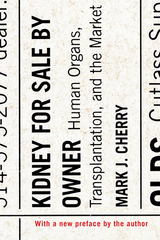
If most Americans accept the notion that the market is the most efficient means to distribute resources, why should body parts be excluded?
Each year thousands of people die waiting for organ transplants. Many of these deaths could have been prevented were it not for the almost universal moral hand-wringing over the concept of selling human organs. Kidney for Sale by Owner, now with a new preface, boldly deconstructs the roadblocks that are standing in the way of restoring health to thousands of people. Author and bioethicist Mark Cherry reasserts the case that health care could be improved and lives saved by introducing a regulated transplant organs market rather than by well-meant, but misguided, prohibitions.
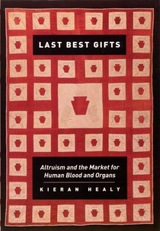
Last Best Gifts offers a fresh perspective on this ethical dilemma by examining the social organization of blood and organ donation in Europe and the United States. Gifts of blood and organs are not given everywhere in the same way or to the same extent—contrasts that allow Kieran Healy to uncover the pivotal role that institutions play in fashioning the contexts for donations. Procurement organizations, he shows, sustain altruism by providing opportunities to give and by producing public accounts of what giving means. In the end, Healy suggests, successful systems rest on the fairness of the exchange, rather than the purity of a donor’s altruism or the size of a financial incentive.
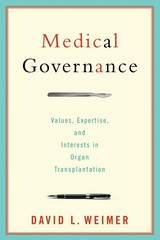
Governments throughout the industrialized world make decisions that fundamentally affect the quality and accessibility of medical care. In the United States, despite the absence of universal health insurance, these decisions have great influence on the practice of medicine.
In Medical Governance, David Weimer explores an alternative regulatory approach to medical care based on the delegation of decisions about the allocation of scarce medical resources to private nonprofit organizations. He investigates the specific development of rules for the U.S. organ transplant system and details the conversion of a voluntary network of transplant centers to one private rulemaker: the Organ Procurement and Transplantation Network (OPTN).
As the case unfolds, Weimer demonstrates that the OPTN is more efficient, nimble, and better at making evidence-based decisions than a public agency; and the OPTN also protects accountability and the public interest more than private for-profit organizations. Weimer addresses similar governance arrangements as they could apply to other areas of medicine, including medical records and the control of Medicare expenditures, making this timely and useful case study a valuable resource for debates over restructuring the U.S. health care system.
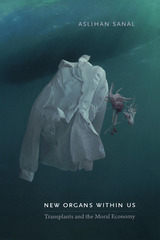
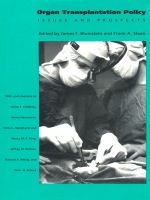
A June 1988 symposium at Vanderbilt University gathered leaders in a wide variety of fields to synthesize the current state of knowledge concerning organ transplantation policy and to access policy options. Collected here are the revised papers presented at that symposium; also included is one influential earlier paper on the same topic. Together, they constitute a major contribution to the debate on organ transplantation policy and its moral, legal, financial, and political implications.

The replacement of a diseased organ by a healthy one is a medical dream that has become a reality for thousands of men and women, boys and girls. Once considered experimental and highly risky, human tissue and organ transplantation is today's successful therapy for disorders affecting the heart, liver, kidney, pancreas, eyes, ears, and bone marrow. Combining the most advanced techniques in surgery, immunology, infectious diseases, cardiology, nephrology, psychiatry, and nursing, organ transplantation is at the forefront of medical science.
Despite the advances in transplantation, the literature available to a potential transplant recipient is scant. This book, written by members of the world-renowned transplant team at the Massachusetts General Hospital in collaboration with a veteran medical journalist, is expressly created for patients and their families, the lay public, and allied health personnel. With an unparalleled sweep, the authors present a history of human organ transplantation, a review of transplant immunology and antirejection drugs, a survey of the national donor organ network, a characterization of the hospital transplant team, and the process of harvesting donor organs. They also discuss the realities of surgery and recovery; potential complications, and hints for transplant recipients and their families on how to cope with the stresses of illness, the wait for a donor organ, and the transplant operation itself.
In providing a clear picture of what to expect from an organ transplant, the authors include case studies of patients' experiences before and following transplantation, and they depict how patients and their families interact with the hospital's medical team. As a result, this book offers a sympathetic and unsensationalized guide for the more than 20,000 patients each day who await an organ transplant-and for those who are intimately involved with the patient's successful recovery.
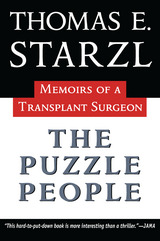
Given the tensions and demands of medicine, highly successful physicians and surgeons rarely achieve equal success as prose writers. It is truly extraordinary that a major, international pioneer in the controversial field of transplant surgery should have written a spellbinding, and heart-wrenching, autobiography.
Thomas Starzl grew up in LeMars, Iowa, the son of a newspaper publisher and a nurse. His father also wrote science fiction and was acquainted with the writer Ray Bradbury. Starzl left the family business to enter Northwestern University Medical School where he earned both and M.D. and a PhD. While he was a student, and later during his surgical internship at the Johns Hopkins Hospital, he began the series of animal experiments that led eventually to the world’s first transplantation of the human liver in 1963.
Throughout his career, first at the University of Colorado and then at the University of Pittsburgh, he has aroused both worldwide admiration and controversy. His technical innovations and medical genius have revolutionized the field, but Starzl has not hesitated to address the moral and ethical issues raised by transplantation. In this book he clearly states his position on many hotly debated issues including brain death, randomized trials for experimental drugs, the costs of transplant operations, and the system for selecting organ recipients from among scores of desperately ill patients.
There are many heroes in the story of transplantation, and many “puzzle people,” the patients who, as one journalist suggested, might one day be made entirely of various transplanted parts. They are old and young, obscure and world famous. Some have been taken into the hearts of America, like Stormie Jones, the brave and beautiful child from Texas. Every patient who receives someone else’s organ - and Starzl remembers each one - is a puzzle. “It was not just the acquisition of a new part,” he writes. “The rest of the body had to change in many ways before the gift could be accepted. It was necessary for the mind to see the world in a different way.” The surgeons and physicians who pioneered transplantation were also changed: they too became puzzle people. “Some were corroded or destroyed by the experience, some were sublimated, and none remained the same.”
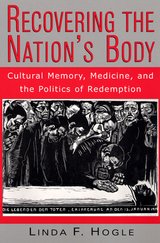
The body is both a site for medical practice and a source of therapeutic and scientific tools. As such, there are a variety of meanings ascribed to the body which both affect and are affected by cultural, economic, political and legal complexities. In order to access and use body parts, Linda F. Hogle states, transformative scientific and cultural processes are brought into play. Nowhere is this more evident than present-day Germany, where the spectre of Nazi medical experimentation still plays a large role in national policies governing the use of body parts and the way these policies are put into practice. In their efforts to be perceived as not repeating atrocities of the past, German medical practitioners and policy-makers reformulate ideas of bodily violation. To further confuse the issue, the reunification of East and West Germany has engendered new questions about the relationship between individuals’ bodies, science, and the state.
Hogle shows how “universal” medicine is reinterpreted through the lens of national and transnational politics and history, using comparative examples from her research in the United. States. Recovering the Nation’s Body is the first book to analyze the actual practices involved in procuring human tissue, and the first to examine how the German past and the unique present-day situation within the European Union are key in understanding the form that medical practices take within various contexts.

In Replacement Parts, internationally recognized bioethicist Arthur L. Caplan and coeditors James J. McCartney and Daniel P. Reid assemble seminal writings from medicine, philosophy, economics, and religion that address the ethical challenges raised by organ transplantation. Caplan's new lead essay explains the shortfalls of present policies. From there, book sections take an interdisciplinary approach to fundamental issues like the determination of death and the dead donor rule; the divisive case of using anencephalic infants as organ donors; the sale of cadaveric or live organs; possible strategies for increasing the number of available organs, including market solutions and the idea of presumed consent; and questions surrounding transplant tourism and "gaming the system" by using the media to gain access to organs.
Timely and balanced, Replacement Parts is a first-of-its-kind collection aimed at surgeons, physicians, nurses, and other professionals involved in this essential lifesaving activity that is often fraught with ethical controversy.
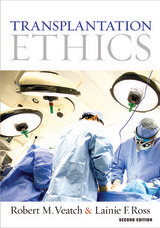
Although the history of organ transplant has its roots in ancient Christian mythology, it is only in the past fifty years that body parts from a dead person have successfully been procured and transplanted into a living person. After fourteen years, the three main issues that Robert Veatch first outlined in his seminal study Transplantation Ethics still remain: deciding when human beings are dead; deciding when it is ethical to procure organs; and deciding how to allocate organs, once procured.
However, much has changed. Enormous strides have been made in immunosuppression. Alternatives to the donation model are debated much more openly—living donors are used more widely and hand and face transplants have become more common, raising issues of personal identity. In this second edition of Transplantation Ethics, coauthored by Lainie F. Ross, transplant professionals and advocates will find a comprehensive update of this critical work on transplantation policies.
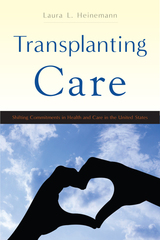
READERS
Browse our collection.
PUBLISHERS
See BiblioVault's publisher services.
STUDENT SERVICES
Files for college accessibility offices.
UChicago Accessibility Resources
home | accessibility | search | about | contact us
BiblioVault ® 2001 - 2024
The University of Chicago Press









